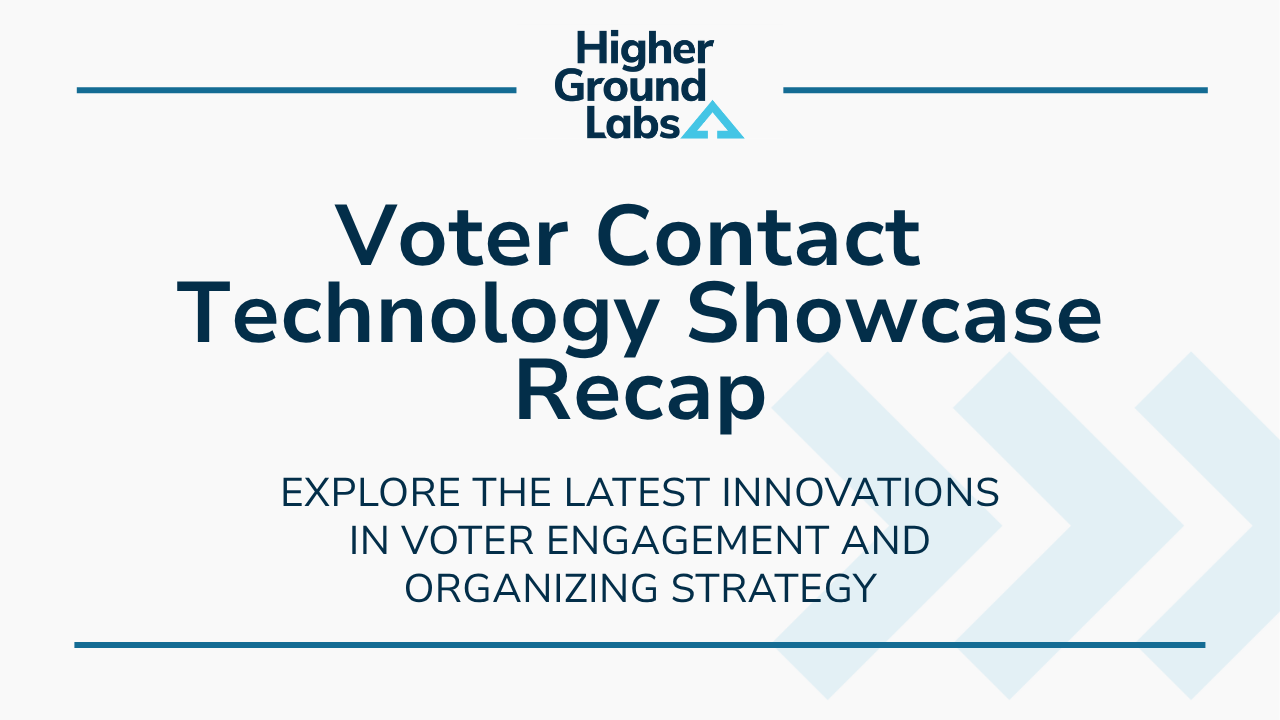At Higher Ground Labs, we invest in technology that helps progressives win. That has been our core mission since 2017, and it guides our work every day. To help fulfill that mission, we write an annual investment thesis to highlight specific areas of underinvestment and technological need in the progressive ecosystem. The last year has brought significant changes to the space–- new entrants and natural consolidations. The evolving landscape informs our decision-making process around new strategic investments in 2022.
Why an investment thesis?
Thesis-driven investing can help the movement align on shared priorities. To better understand gaps in political technology, we interviewed and collaborated with partners across the progressive movement. We listened closely to capture a diverse set of viewpoints and a wide range of perspectives. Political tech only works when it is accessible, inclusive, and usable, and we appreciate those who have shared their honest assessments of where we need to do better and fill the gaps.
What are our investment priorities in 2022?
For 2022, our investment thesis builds on our thesis for 2021, with a continued focus on election tech, particularly around content creation, voter contact and data sharing. We are also seeking technologies that harness the power of Web3 to improve progressive organizing.
How do I get involved?
If you are a progressive-aligned founder, technologist, organizer, or dreamer, we want to hear from you. We aim to invest behind these theses but are always open to complementary ideas and opportunities that expand and benefit our space. No matter your background, creed, race, religion, or gender, there is room for your vision. We aim to create an inclusive community and hope your idea can be a part of it.
To learn more, apply to our accelerator or email info@highergroundlabs.com.
Investment Thesis
1. Generate a 360-degree view of voters and volunteers:
The tools we use to access voter data have evolved over the past year. As campaigns and organizations put more resources into data, we see an even greater desire to access, manipulate, and share that data across programs. We continue to see silos between field and digital data. We struggle with data portability between systems. And with new data warehousing infrastructure for our space, we can begin thinking more broadly about how to solve these challenges at scale.
2. Empower progressive content creators:
All large technology platforms will limit or outright ban paid political activities. We will need tools that allow campaigns and causes to reach their voters organically. The Internet is also getting smaller, as more communities are moving towards closed, trusted information ecosystems. Content and trusted messengers will be the superhighway to reaching those closed ecosystems. We have underinvested in combating misinformation and in supporting informative, fact-based, attention-winning media content. We need new ways of rewarding content creators for their impact.
3. Improve the direct-to-voter messaging experience:
In 2020, voters were flooded with calls and texts from political organizations. Yet the DNC reports that general contactability rates are plummeting, and we may be missing crucial voters. We have outgrown much of our current voter contact infrastructure. In order to maximize yield from our electorate, we must innovate on tools and centralized hubs that facilitate one to many communications. We must also reach voters on new platforms where they spend time and actively engage. Influencer marketing is playing an increasingly important role in voter outreach and we want to ensure it is an accessible tactic for all progressive campaigns
4. Leverage the power of Web3 in progressive tech
As blockchain brings Web3 to the forefront and crypto commands the dollars of investors across industries, we can begin exploring what Web3 might mean for the political tech space. Whether accepting crypto as donations, using NFTs (non-fungible tokens) to reward donors and volunteers, or DAOs (decentralized autonomous organizations) for distributed organizing, we are eager to explore solutions that put progressive campaigns and organizations at the cutting edge of this quickly evolving form of engagement.
5. Fintech innovations for the progressive ecosystem:
Political spending has increased at ~8% annually since 1980, an astounding compounded growth. Though campaigns are awash in money, they lack sophisticated enterprise-grade financial tools and innovations. These could include accepting crypto as donations, integrations with mobile transaction platforms, media rate forecasting and more automated compliance.



